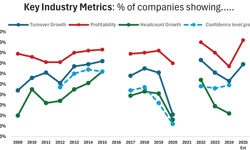I am sure the following situation - dealing with defaulting advertisers - occurs sufficiently widely within the magazine publishing industry to warrant investigation into how best to deal with it.
Probably, like most publications ought to be doing, there are procedures in place for collecting debts - starting with the media pack T&C plus other written contractual items which can be sent to underscore the responsibilities for the advertiser.
In thirteen years of publishing, we probably have had a dozen cases which have needed collection by credit control agencies, but, in addition to all the extra paperwork, often you never really get the full amount back. There is also the situation in which, whilst you may have a court judgment in your favour, collecting the money can be a different matter altogether. Add into the equation the necessity, in the US, for having to travel to the state in question, which often may have its own particular laws, and the complexity and hassle involved starts to become clear. Particularly when the defaulter knows this.
Lately, there is one defaulter which, having personally pledged to repay the outstanding amount from an ad series, has since gone bust and then started up again in the same premises under a new name. This leaves a bad taste in the mouth for us, the magazine, and it should not be our problem to learn how to deal with them - for example, at tradeshows - as though nothing had happened.
Another has quietly undergone a change of ownership status and, as its way of dealing with its debt, prefers not to communicate. To them, agreeing to advertising seems to come with optional payment.
However, it has long occurred to us that industry magazines represent a very powerful publicity vehicle - otherwise why are so many keen to use us? - and we wondered whether, being in the right, there would be any legal comeback on us should we decide to name and shame the defaulters. We would plan to advise them of our intention first by way of offering a further chance to settle what they owe.
Indeed, what is the legal position and how should we phrase our ‘naming and shaming’ offensive? We would hope that the threat of exposure to be sufficient in itself, and, besides, it is not the magazine that should be put on the defensive should they wish to challenge, legally, what we threaten to do by exposing them. Our response would be to say: “Get your lawyers involved and let's have the whole sorry episode of your defaulting right out in the open for all the industry to see.”
If I were a defaulting advertiser, I would be quite upset about what could be written for all the industry to see. That said, if I am behaving in an unbusinesslike manner and not paying my bills, then I have that much coming. We do not feel that the act of naming and shaming should automatically impact us negatively.
It also seems that where such situations occur with competitor magazines in our particular sector, they tend to say nothing while just quietly writing the debt off. Again, this seems so wrong, especially when we consider the power at a magazine's disposal. And, given that unique power, neither should we allow ourselves to be put in a position where it should cost us further money to retrieve just a fraction of it. The two situations, above, represent a hard-earned $12,500 for us.
We would be interested to know if the wider publishing industry agrees… what wording we can best get away with and indeed if any fellow publishers have any proven strategies that work in getting defaulters and other recalcitrants to pay what they owe.












